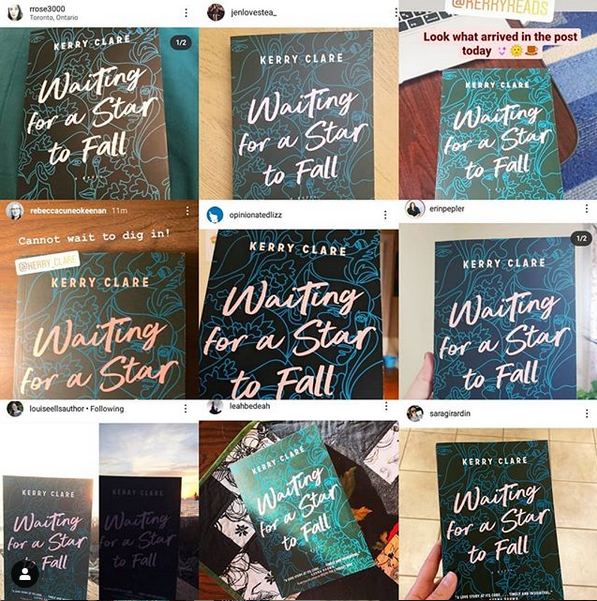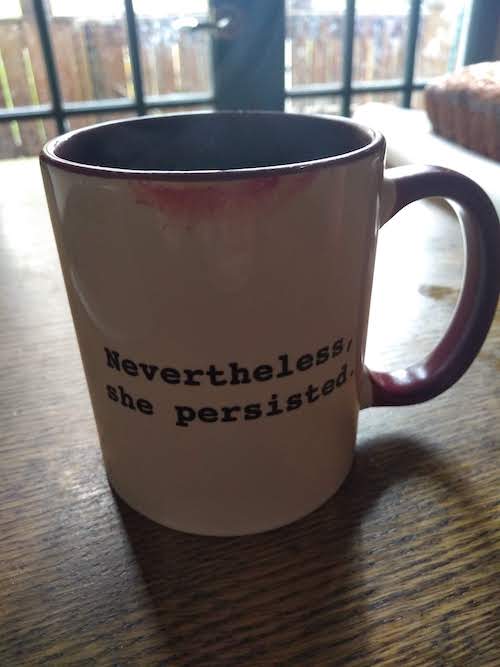November 13, 2020
More Stars…

- “What sets Clare’s novel apart from a lot of the media discourse around the #MeToo movement is that Clare sets the story at a point where Brooke herself is still ambivalent about her feelings for Derek.”
- Under-the-radar books at Frolic
- “Waiting for a Star to Fall is funny and heartbreaking and infuriating all at once.”
November 12, 2020
Monogamy, by Sue Miller

Sue Miller is one of those ubiquitous American older woman writers I know nothing specific about, occupying the same part of my brain that Anita Shreve does, very 1990s’ Oprah’s Book Club. I read and reviewed her The Senator’s Wife in 2008, early on my book blogging career, although I don’t remember anything about the book or my review, but looking back, I’m proud of the young reviewer who provided the following insight: “Revelation more often does come in a glance, in a breeze, the turn of a head and the expression on one’s face. The sort of thing you can hardly put your finger on, and certainly cannot explain.”
I became interested in her latest novel Monogamy after reading Richard Russo’s review in The New York Times, and I bought the book with my ticket to the Book Drunkard Festival (tonight!). Reading the novel over the last couple of days, and it was one of those books I was disappointed to get to the end of. It was wonderful. Why have I not been reading everything Sue Miller has ever written in the years since The Senator’s Wife? (And why was I waiting for permission from Richard Russo to find her work interesting?)
The novel presents as realism, so real that certain moments are excruciating in that way (it seems) that only real life can be. Misunderstandings, and miscommunications, secrets brought to the surface, words that should never have been said but can’t be taken back. And heartbreak, and heartache, the devastation of grief, the unease of a life’s foundation beginning to crumble.
The ways in which characters are never truly known to each, or—even worse—the inexpressible things we know about the people we love and wish we didn’t.
But in a way, the novel is not realism at all, at least not in a literary sense. Beginning, middle and end. Climax and denouement. Central protagonist and secondary characters. A narrative line you could draw on the page.
When if you started to draw the narrative of Monogamy, the lines would turn to swirls intersecting with swirls, an abstract creation, a web. Strange and dazzling.
At the centre of the web, purportedly, is Graham, a man of large character and appetites, a character whose absence we understand after his sudden death because we’ve been following his point of view intermittently through the first third of book. But the centre shifts as the story proceeds, from character to character—Graham’s first wife, his son and his wife, and Graham’s daughter with his second wife, Annie, and it is is Annie to whom this story mostly belongs. But not entirely—from the other characters, we learn perspectives (including perspectives about Annie herself) that Annie has no idea about. And perhaps it’s the reader who is the centre of the novel after all.
They are recognizable, so many of these moments. “The sort of thing you can hardly put your finger on, and certainly cannot explain.” This is a novel about marriage, and family, and gender, and art-making, and generation gaps, and mother-rage, and friendship, and aging, and widowhood, and independence. About loyalty and betrayal, and love and forgiveness…but never is the story one-dimensional enough to be about just one of these. A many sided object catching the light in different places every time, strange and dazzling, like I said. Like life itself is.
Which is just an illusion, of course. Miller writes about Graham once explaining that the appeal of fiction is that it suggests our lives have shape after all, sequence and consequence, and that there is meaning in the randomness, the unfathomableness. And that this book manages to critique art as life, and then be art as life at once, and my mind is spinning, and what a testament to the novel is that.
November 11, 2020
Poppies

As most people don’t care about in the slightest, for good reason, I have complicated feelings about Remembrance Day. Sometimes I feel like the messaging and symbolism are manipulative, an idea whose simplicity belies it’s true complexity. My grandfathers were proud of their service in WW2, but it was also them who taught me (in addition to “Don’t tattoo anchors on your forearm”) that what a waste is war. The trauma for the people who fight our wars and their families is often insurmountable, and these people do not receive sufficient support. War is bad for everyone, and while I understand that it can’t be obliterated altogether, I am sure there would be less of it if we didn’t have a massive industry that relies on its existence. The most amazing way I can think of to honour those we’ve lost in wars is to stop sending more people to be traumatized or die, instead of glorifying the waste of human life as sacrifice. One other way is to resist fascism in all its forms—my grandfathers (Canadian Navy), maternal grandmother (WW2 nurse), and paternal grandmother (held down the home front while her husband was away for years) were my OG anti-fascists and may their righteousness be our guiding light.
November 10, 2020
Gleanings

- I think of the form as endlessly open and capacious, willing to accept experiments, bars of music, instructions for grafting, soup recipes, the history of Ukrainian embroidery, the life cycle of a blue mussel, meditations on mortality, dissertations on historical events, dream diaries, and colour wheels. Anything else? Whatever a writer needs.
- I can’t imagine a more invigorating way to begin each day.
- When I posted it on FB, a friend commented that it looked like an Arthurian castle. It is a post-industrial castle.
- “The word diptych comes from the Greek root “dis,” meaning “two,” and “ptykhe,” meaning “fold.”
- Today, I’m focusing on people who are achieving impossible things for people they don’t know.
- Minor missteps aside, Self Care ends up as a surpassingly dark comedy about a consumerist society that continues to elevate an artificial ideal of women in the place of authentic experience or humanity.
- And sometimes you also need to curl up in a ball and take care of yourself. Here are some comfort read suggestions if that’s where you’re at right now.
- The company manufactured cutlery, scissors, cabinets, and other goods. And as it turns out, elegant folding trays so a small boy and the man he became can enjoy breakfast in bed.
- When expectations are low one really appreciates the little things; a blue sky (that always feels like a gift from the universe) and the homemade slice of cake your friend bakes you.
- True-blue, life-long friends make this life so worth living – having people around that love us for who we are, care about us, make us giggle, and make a point to reach out to us.
- I try to do the best I can, with the information and resources I have. I’m often wrong; I am thankful for so many second chances.
Do you like reading good things online and want to make sure you don’t miss a “Gleanings” post? Then sign up to receive “Gleanings” delivered to your inbox each week(ish). And if you’ve read something excellent that you think we ought to check out, share the link in a comment below.
November 6, 2020
Has Women’s Fiction Helped to Save Us?

Almost four years ago exactly, against the background of a horrifying US election outcome and a world I didn’t recognize, I wrote a blog post entitled “How Women’s Fiction Can Save Us All.”

Which was more than a little bit self-serving, of course, considering my debut novel, Mitzi Bytes, was coming out the following spring.

So it was kind of like your mechanic telling you how replacing your muffler kills fascists, or the real estate agent explaining how buying a town-home is the only sure route out of an authoritarian disaster. My post was totally ridiculous, over-earnest and embarrassing, but those were heady times and also—and here’s the pivotal thing—I wasn’t wrong.

And just how wrong I wasn’t occurred to me this morning as I scrolled through bestselling author Emily Giffin’s Instagram stories, which have been my go-to through this strange uncertain week while American votes are counted. All week long, Giffin has been unwavering in her confidence that America—and her home state of Georgia in particular—would deliver the Biden/Harris ticket a victory.

For months, Giffin’s feed has been decidedly political, anti-Trump sentiments, pro-LGBTQ and Black Lives Matter. Amidst snapshots of Charles and Diana, and Brad Pitt and Jennifer Aniston, of course—Giffin’s Insta is a world onto itself. But no matter the followers who threatened to unfollow and or to boycott her novels, Giffin has been insisting on making it political most of the time.

(It only underlines my thesis too that Stacey Abrams— whose fight against voter suppression since losing her Governor race in 2018 deserves huge credit for turning Georgia blue—includes “romance novelist” among her many other accomplishments.)

And Giffin has been taking her politics offline as well. Her 2018 novel All We Ever Wanted was a powerful exploration of toxic masculinity and the ways in which privileged white women are culpable in perpetuating it.

It joined other novels like Jodi Picoult’s A Spark of Light, also published in 2018, delving into the personal stories behind the polarized issue of abortion. 2018 was also the year Tayari Jones published An American Marriage, which would go on to win the 2019 Women’s Prize for Fiction, painting plain the reality of being a Black man (and a Black wife) in America.

And these books were not anomalies. Candice Carty-Williams’ Queenie was billed as a Black Bridget Jones when it came out in 2019, but where Bridget was sliding down fireman’s poles (and more power to her!) Queenie was writing about US police shootings. Chick-lit queen Jennifer Weiner’s 2019 novel Mrs. Everything takes on more than a half-century of American misogyny and missed opportunities for women to succeed.

Celeste Ng’s smash hit 2017 novel Little Fires Everywhere is a devastating indictment of race, class and privilege and the outsized role they play in a very unequal America.
And Meg Wolitzer’s Female Persuasion, and Brit Bennett’s The Vanishing Half, Such a Fun Age, by Kiley Reid, Miracle Creek, by Angie Kim, and so many more.
In Canada, novelists Marissa Stapley and Karma Brown have penned fierce and furious feminist bestsellers with The Last Resort and Recipe for a Perfect Wife.

In further signs of progress since my post four years ago, the commercial fiction landscape in Canada has evolved beyond being a boring monolith of white writers, with the success of books like Uzma Jalaluddin’s Ayesha at Last and Farah Heron’s The Chai Factor, both of which manage to tackle racism and anti-Muslim hate in the context of love stories (no mean feat!). And even better, underlining that “diverse stories” (I hate that phrase) aren’t just a flash in the pan—both of these authors have new novels coming out next year.

And more commercial novels by Canadian authors of colour? Check out Jane Igharo, Roselle Lim, Jennifer Hillier, crime novelist Ausma Zehanat Khan, and YA novelist SK Ali, among others. The very existence of books centring the experiences of characters of colour is a political act, and many of these authors don’t shy away from more overt politics either, as they write plots that are also romantic, compelling, and great.

(Um, and yes, I have a new book out again, a novel about power and politics and the myths we create about ordinary men and leadership, and what we do about men who might not be monsters but whose behaviour is not okay.)
This week I listened to the CBC Pop Culture podcast Pop Chat, which considered the pop culture response to US politics over the last four years, determining that the output (mainly bad Saturday Night Live sketches) had been fairly disappointing, films like Get Out and Parasite aside. (They didn’t even mention Demi Lovato’s “Commander in Chief” though! I love that song!)
The consensus being that a US president who sucks all the air out of the atmosphere as the 45th did (DID. I’m doing past tense. I’m going there. It’s been too long. I AM READY), who is so over-the-top and in defiance of credulity and reality, whose entire construct of the world seems to be a fiction—well, what are artists meant to do with that?
But the women who write commercial fiction have done a lot, responding to the moment and truly rising to the occasion.
These books—part of a genre that so rarely gets the respect it deserves—are one terrific legacy of this terrible, awful time. When people look back at these works published during the second half of the last decade—at the questions these authors have been grappling with, the issues confronted head-on, the taboos finally broken, voices being heard, stories that are finally being told—I hope it’s going to seem obvious that the patriarchy was on its final legs, quaking in its ugly boots.
And good riddance.
November 5, 2020
Fake It So Real, by Susan Sanford Blades

One day I’m going to write a list of all my CanLit aversions (among them, the notion of “CanLit” at all), and near the top of the rankings will be Alice Munro as a lazy and meaningless cultural shorthand. Sometimes, though, the comparison fits, and Susan Sanford Blades’ debut, Fake It So Real, is a case where the comparison might be apt.
First, because the book is a novel/story collection hybrid ala Lives of Girls and Women, moving between first and third-person narration. The city of Victoria setting too, and the book’s complicated and messy depiction of motherhood and womanhood, women who chafe at the limits of “wife” and transgress them. Alice Munro, but make it punk? Beginning in the 1980s, as Gwen gets together with a charismatic musician and has kids before he blows out of their life altogether. She struggles to keep it together and mainly doesn’t, unable to quit drinking and wracked with social anxiety. This is not a story of happily ever after, but instead one of hardscrabble and losing, fucking up over and over again. Which doesn’t make for the most compelling argument to read this book, I realize, but it’s also just really really good, crafted with care and precision.
I felt this way when I fell in love with Leona Theis’s If Sylvie Had Nine Lives in September, a book whose effort never shows, whose seams and joints are invisible. It just works, and as a reader, it’s such a pleasure to submit to a book that’s so well constructed. To let it take you where it goes, and this one goes through the decades as Gwen’s daughters, Sara and Meg, make their own way into the world, try to account for their parents’ failures, attempt to make their own families in different ways, inevitably failing to live up to ideals, as one might expect, but I appreciate the way that Blades interrogates motherhood while not evoking the usual cliches. Her characters’ experiences are singular and interesting, and rich and fraught with complication.
Fake It So Real manages to be not a glorification of counterculture or a condemnation of it either. This is not a book that comes with an agenda, except to tell a story of love and family that is achingly real.
November 5, 2020
If You Have US Election Anxiety…
If you have US Election Anxiety, I really recommend you revisit my recent post “You Get to Frame Your Own Picture,” and then start listening to the You’re Wrong About podcast. Unlike most people, I am having a GREAT week. Partly because I went to bed Tuesday night convinced of defeat, and woke up to that peculiar emotion called optimism that I’ve not experienced in years. Like, the climate might have a fighting chance? It’s an incredible thing, but in the meantime when there’s nothing to see or know yet, I recommended refreshing your browser instead to the absorbing stories of Chandra Levy and Gary Condit, Dan Quayle v. Murphy Brown, or the Preppy Murder, just in case you needed reminding that America has always been more than a bit ridiculous but also really hard to look away from
November 3, 2020
This Is Not a Victory Cake

If you go back in my archives, you’ll find my posts from four years ago about, first, the victory cake I baked, and then, afterwards, how much I regretted that cake. It did not taste good. I learned a lot from that unfortunate cake, and I’ve continued to learn in the months and years since. I’ve been thinking a lot lately about how important it is to learn you can lose, that justice is not inevitable. The arc is longer than we thought. In early 2017, I was reading a biography of Jane Jacobs, and someone commented that Jacobs was so remarkable because she’s one of the few people who ever managed to win, and I’d never thought of that before. That goodness doesn’t always triumph, that it usually doesn’t—which is so counter to everything I ever understood growing up against the crumble of the cold war, the end of history and all. But nothing really is ever so definitive, and I think about this as I contemplate going forward and how to frame ideas, and about how going all or nothing is possibly to set oneself up for defeat. How it is necessary too to understand that winning/losing is not the binary you might think it is. Nothing is simple, nothing at all.
Except: don’t bake a cake before you’ve won. And I haven’t. I’ve made a cake though, and that’s because I have a friend stopping by to visit this afternoon, and it’s called hospitality. And also because we’re heading into that time of year where the sky gets dark fast and Smitten Kitchen’s grapefruit cake adds some necessary brightness, sunshine. You can make your own sunshine, no matter what else is going on, I suppose, is what I’m saying with this cake. Not blind optimism this time, fingers crossed, but light in the darkness instead.
November 3, 2020
Gleanings

- I’m Still Reeling From 2016. Am I Now Allowed to Hope Again?
- In this Year of the Weird, I’m coming to understand that pre-ordering can be a significant act of literary citizenship.
- I’ve been walking on this beach for three hundred years and have never seen stones this shape much less two,
- Last October, I started what may become a new tradition, recording my Octoberests, the seven most magical elements of the month!
- From start to finish, with two firings in between, a plate usually takes me about two weeks to make. And that’s just a plate. Imagine a teapot!
- It has no heroes and, surprisingly, not really any villains either, because those categories rely on absolute perspectives that are simply not sustainable.
- Tomorrow is Election Day. The past four years have hurt like hell. I wish I had words of comfort or inspiration to send out to the world, but I really only have a message of care. May we all take care, may we extend care, may we value the care we receive from others.
- On days when it’s easy to count far more than three blessings, this is a reminder of our great good fortune. On days when we’re struggling . . . this is a reminder of our great good fortune.
- If the pandemic has taught me anything, it’s that the answers in a crisis, as in ordinary life, change with the circumstances, require monitoring and reassessment, and must shift to take many factors into consideration. In other words: there are no easy answers
- Whatever happens next week, and I hope what happens will bring us before and into some great and formidable wedge of light, leaving us blinking and gasping, whatever happens, we will need to adjust our eyes.
- So, without further ado, as they say at the end of every episode of Writing Excuses: “You’re out of excuses. Now GO WRITE!”
Do you like reading good things online and want to make sure you don’t miss a “Gleanings” post? Then sign up to receive “Gleanings” delivered to your inbox each week(ish). And if you’ve read something excellent that you think we ought to check out, share the link in a comment below.
November 2, 2020
Santa Monica, by Cassidy Lucas

Oh, what would you give for a thriller that isn’t stupid?
Do you know what I mean? To be able to get lost in a book that is fluffy and silly, but doesn’t jump the shark to become completely preposterous. A book that is delectable as a hot fudge sundae, but whose characters are well drawn and real, with plausible dialogue, and who make sense as human beings? For a plot that is genuinely gripping and surprises you completely at least twice? Where “enjoyable” is not synonymous with “bad?”
I was expecting to have fun reading Santa Monica, by Cassidy Lucas, but that the book was so excellently crafted turned out to be the most amazing surprise. Beginning with the end, the much revered fitness coach found dead in his studio, and whodunnit? Cassidy Lucas (the pen name for writers Julia Fierro and Caeli Wolfson Widger) going back to the start to show how everyone has a motive: the woman he was sleeping with, her husband, the woman who was helping him steal from the fitness studio, and her husband, and his sister, and any of the nubile women of Santa Monica with whom Zack had been sleeping. Plus there’s a transplanted Brooklynite who is having trouble fitting in with her new California lifestyle, the perfect mom whose family is looming on the edge of terrifying debt, the housekeeper hoping to evade ICE authorities and raise her son in America, and more.
I loved it. Such a pleasure, and not a guilty one at all.




